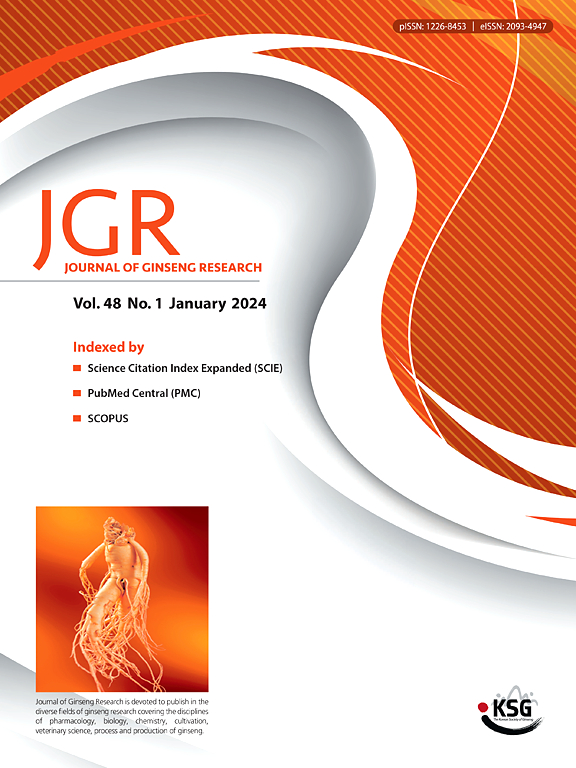Effects of red ginseng extract and red ginseng dietary fiber on the maintenance of intestinal immune and functional homeostasis in diet-induced obese mice
IF 6.8
2区 医学
Q1 CHEMISTRY, MEDICINAL
引用次数: 0
Abstract
Background
Obesity is an important risk factor of intestinal inflammatory disease. This study aimed to evaluate the effects of Red ginseng extract powder (RGEP) and Red ginseng dietary fiber (RGDF) on the maintenance of immune and functional homeostasis in recovering obesity-induced impairment of intestinal immunity.
Methods
Diet-induced obesity in C57BL/6 male mice was achieved by feeding them a 60 % high-fat diet for six weeks. The diet-induced obese (DIO) mice were administered RGEP (205, 410, or 820 mg/kg), fructooligosaccharide (FOS, 820 mg/kg), or RGDF (410, 820, or 1640 mg/kg) once daily for 4–8 weeks. The effects of RGEP or RGDF administration were evaluated via stool trait and gastrointestinal (GI) motility, inflammatory biomarkers and cytokines in mesenteric lymph nodes and intestine, mucosal protective genes, bacterial toxicity, and histopathological features of the intestines.
Results
RGEP or RGDF administration to the DIO mice reduced mucosal barrier damaging factor (α1-antitrypsin), inflammatory cytokine levels, factors related to inflammatory responses (C-reactive protein (CRP), iNOS, NF-κB, MPO, and Calprotectin), and levels of urinary indican and intestinal β-glucuronidase. Conversely, RGEP or RGDF administration increased intestinal motility, levels of short-chain fatty acids (SCFAs) and β-defensin-2, and mucus barrier functional factor (MUC2) expression. Histopathological features of the small intestine recovered to normal levels after RGEP or RGDF administration.
Conclusion
Our results demonstrated that RGEP and RGDF were effective for maintaining intestinal immune and functional homeostasis by recovering impaired immune and barrier function in DIO mice.

红参提取物和红参膳食纤维对饮食性肥胖小鼠肠道免疫和功能平衡维持的影响
背景:肥胖是肠道炎症性疾病的重要危险因素。本研究旨在探讨红参提取物粉(RGEP)和红参膳食纤维(RGDF)在恢复肥胖引起的肠道免疫损伤中维持免疫和功能稳态的作用。方法C57BL/6雄性小鼠连续6周以60%高脂饮食诱导肥胖。饮食诱导肥胖(DIO)小鼠每天1次给予RGEP(205、410或820 mg/kg)、低聚果糖(FOS, 820 mg/kg)或RGDF(410、820或1640 mg/kg),持续4-8周。RGEP或RGDF的作用通过粪便特征和胃肠道(GI)运动、肠系膜淋巴结和肠道中的炎症生物标志物和细胞因子、粘膜保护基因、细菌毒性和肠道组织病理学特征来评估。结果rgep或RGDF可降低DIO小鼠黏膜屏障损伤因子(α - 1-抗胰蛋白酶)、炎症细胞因子、炎症反应相关因子(c -反应蛋白(CRP)、iNOS、NF-κB、MPO和钙保护蛋白)、尿氮和肠道β-葡萄糖醛酸酶水平。相反,RGEP或RGDF可增加肠道蠕动、短链脂肪酸(SCFAs)和β-防御素-2水平以及粘液屏障功能因子(MUC2)的表达。RGEP或RGDF给药后小肠组织病理学特征恢复到正常水平。结论RGEP和RGDF通过恢复DIO小鼠受损的免疫和屏障功能,可有效维持肠道免疫和功能稳态。
本文章由计算机程序翻译,如有差异,请以英文原文为准。
求助全文
约1分钟内获得全文
求助全文
来源期刊

Journal of Ginseng Research
CHEMISTRY, MEDICINAL-INTEGRATIVE & COMPLEMENTARY MEDICINE
CiteScore
11.40
自引率
9.50%
发文量
111
审稿时长
6-12 weeks
期刊介绍:
Journal of Ginseng Research (JGR) is an official, open access journal of the Korean Society of Ginseng and is the only international journal publishing scholarly reports on ginseng research in the world. The journal is a bimonthly peer-reviewed publication featuring high-quality studies related to basic, pre-clinical, and clinical researches on ginseng to reflect recent progresses in ginseng research.
JGR publishes papers, either experimental or theoretical, that advance our understanding of ginseng science, including plant sciences, biology, chemistry, pharmacology, toxicology, pharmacokinetics, veterinary medicine, biochemistry, manufacture, and clinical study of ginseng since 1976. It also includes the new paradigm of integrative research, covering alternative medicinal approaches. Article types considered for publication include review articles, original research articles, and brief reports.
JGR helps researchers to understand mechanisms for traditional efficacy of ginseng and to put their clinical evidence together. It provides balanced information on basic science and clinical applications to researchers, manufacturers, practitioners, teachers, scholars, and medical doctors.
 求助内容:
求助内容: 应助结果提醒方式:
应助结果提醒方式:


